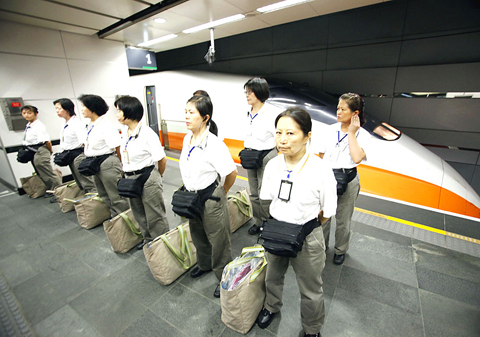Taiwan High Speed Rail Corp (THSRC, 台灣高鐵) chairwoman Nita Ing (殷琪) stepped down from her post yesterday and an ad hoc board meeting elected chief executive Ou Chin-der (歐晉德) to replace her.
Ing, 54, who founded THSRC in July 1998 after winning the nation’s first build-operate-transfer contract to construct the north-south high speed railway two years earlier, said she hoped her resignation could help reverse the company’s finances.
“My career means nothing if more government participation can help the company run smoothly and profitably,” Ing said through THSRC spokesman Ted Chia (賈先德).

PHOTO: NICKY LOH, REUTERS
Chia said Ing announced her decision to step down at the beginning of the board meeting and the board named Ou to the chairmanship under his capacity as the legal representative of the state-run China Aviation Development Foundation (航發會).
The reshuffle, which took effect immediately, ushers in a new era for THSRC, one in which the government will assume a dominant role in deciding the board lineup and management.
The government has a nearly 40 percent stake in the company. THSRC has accumulated more than NT$450 billion (US$13.8 billion) in debts and is seeking a syndicated loan worth NT$390 billion.
Neither Ing nor Ou showed up at the unscheduled press conference after the board meeting. Chia said Ing would remain a board member representing Continental Engineering Corp (大陸工程), one of THSRC’s five founding shareholders, while Ou would serve as both THSRC chairman and CEO.
Last night, however, the company said in a stock exchange filing that Ing would also step down from the board and Continental Engineering would nominate a successor soon.
Chia said the company would call an extraordinary shareholders’ meeting on Nov. 10 to elect a new board of directors and supervisors.
He declined to comment on reports that Ing resigned to ensure government support for the bank loan.
“The former chairperson made no mention of such pressure,” Chia said. “She did extend gratitude to all THSRC employees for helping realize the high speed rail project.”
Ou, 65, a civil engineer by training, will soon brief the media on how he plans to improve the company’s finances and operations, Chia said.
Ou joined the public service sector in the late 1980s and has worked for the national expressway engineering bureau, the public construction commission and the central government. In 1998, he was tapped by then-Taipei mayor Ma Ying-jeou (馬英九) to serve as deputy mayor. He retained his friendly ties to Ma and the Chinese Nationalist Party (KMT) after joining THSRC in 1996 at Ing’s invitation.
Ou has avoided reporters since news broke over the weekend that Ing would be stepping down. Premier Wu Den-yih (吳敦義) said on Sunday that Ing planned to resign.

Intel Corp chief executive officer Lip-Bu Tan (陳立武) is expected to meet with Taiwanese suppliers next month in conjunction with the opening of the Computex Taipei trade show, supply chain sources said on Monday. The visit, the first for Tan to Taiwan since assuming his new post last month, would be aimed at enhancing Intel’s ties with suppliers in Taiwan as he attempts to help turn around the struggling US chipmaker, the sources said. Tan is to hold a banquet to celebrate Intel’s 40-year presence in Taiwan before Computex opens on May 20 and invite dozens of Taiwanese suppliers to exchange views

Application-specific integrated circuit designer Faraday Technology Corp (智原) yesterday said that although revenue this quarter would decline 30 percent from last quarter, it retained its full-year forecast of revenue growth of 100 percent. The company attributed the quarterly drop to a slowdown in customers’ production of chips using Faraday’s advanced packaging technology. The company is still confident about its revenue growth this year, given its strong “design-win” — or the projects it won to help customers design their chips, Faraday president Steve Wang (王國雍) told an online earnings conference. “The design-win this year is better than we expected. We believe we will win

Chizuko Kimura has become the first female sushi chef in the world to win a Michelin star, fulfilling a promise she made to her dying husband to continue his legacy. The 54-year-old Japanese chef regained the Michelin star her late husband, Shunei Kimura, won three years ago for their Sushi Shunei restaurant in Paris. For Shunei Kimura, the star was a dream come true. However, the joy was short-lived. He died from cancer just three months later in June 2022. He was 65. The following year, the restaurant in the heart of Montmartre lost its star rating. Chizuko Kimura insisted that the new star is still down

While China’s leaders use their economic and political might to fight US President Donald Trump’s trade war “to the end,” its army of social media soldiers are embarking on a more humorous campaign online. Trump’s tariff blitz has seen Washington and Beijing impose eye-watering duties on imports from the other, fanning a standoff between the economic superpowers that has sparked global recession fears and sent markets into a tailspin. Trump says his policy is a response to years of being “ripped off” by other countries and aims to bring manufacturing to the US, forcing companies to employ US workers. However, China’s online warriors